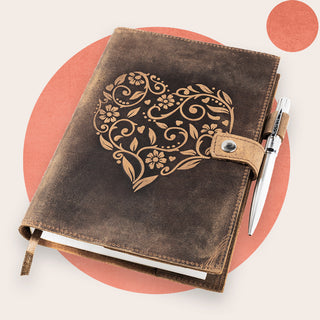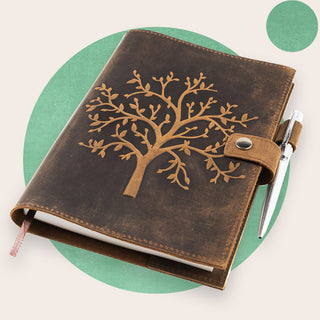Are you constantly afflicted with a burgeoning and inflating sense of stress? Have you tried every other method of stress relief and don't know where to turn? Are you looking to turn your trusty journal into your own personal stress reliever?
Then step forth and saddle up as we explore five top tips for getting started with your own stress relief journal!

Why Journal in the First Place?
Journaling doesn't have to just be used to relieve stress or even for mental health, even though journaling for mental health is arguably an area within which it greatly excels. Journaling is amazing for a number of things, including:
- Identifying fears and concerns that might be the holistic cause of any stress or anxiety that you are experiencing.
- Recognizing any triggers that might exacerbate feelings of stress and thus help with stress management.
- Managing stress more efficiently overall and in turn helping your physical health along on its way.
- Practicing positive discourse with yourself so that you can foster a stronger self-esteem and a confidence within oneself.
All of this will, then, help you to identify and reduce the quantity and quality of any unhelpful and negative thoughts and habits of behavior that you have been exhibiting.

How to Get Started Stress Journaling
So, now we know how this kind of journaling can help to reduce stress, whether it be chronic stress or a shorter-term affliction, how about we explore how to start your very own stress journal?
1. Make It Regular
Fostering a regular journaling habit is one of the best things you can do for your mental health. Much like antidepressants and selective serotonin reuptake inhibitors, journaling takes some time to fully work its magic and works at its best after it has become a proper part of a routine over a period of time.
For the fullest effects, it is best practiced at least a little each day, preferably at a similar time so that you can be as comfortable as possible. This comfort will hopefully encourage you to be more candid and honest with yourself through the journaling practice. The amazing health benefits on offer here far outweigh the relative effort it might take to get started.
2. Simplicity
Pick the medium that best suits you and keep it as simple as possible. Whether you are more inclined to write regularly in an actual notebook or whether you are the kind of person that is more technologically savvy and thus fond of apps instead, you should use a form that is going to be the most comfort for your emotional release.
Arguably most important is to keep it simple and transparent. The last thing you want to do is put yourself off with lots of obliqueness and nebulousness. After all, this whole enterprise is about stress reduction, not instilling more stress in you. The simpler you keep it alongside your own preferences, the easier it will be to pick it up regularly, even if you had a particularly long day at work or would simply rather not.
3. No Rules
Just as it is important to abide by certain rules of simplicity and regularlity, it is equally important to establish a foundation of as few rules as possible so that you don't feel limited in what you can express in your journal. A bullet journal, though, quite marvellous and economical in intent, can feel quite limiting, just as a daily gratitude journal can too.
The idea here is to provide an open format within which you can explore all of the things that instill a stressful atmosphere within you. What good is this journaling practice going to do for, say, your immune system if you inflict a whole bunch of rules upon yourself that just make the whole enterprise more stressful than your life already was?
If the regularlity of it all is too much for you, then you can begin your practice by only writing when inspiration strikes and you feel like talking about the things that are causing stress.
4. Sharing
Because this is your journal, you have the good grace of being able to do whatever you like with it. If you feel like sharing it with a close friend or a loved one - or even posting it online on social media - then you can. Conversely, you can also just keep it to yourself. Perhaps the contents are pretty private and unsuitable for sharing with the world, or perhaps you simply feel as though the world wouldn't give a damn.
It's all relative and contextual, though. Some of the things you are stressed about might actually be helped along by sharing your own studies in stress with the world, whether that only be to those most immediately closest to you or whether you send it out into the world via social media. Again, the choice is yours for the making.
5. Therapy
One of the best things you can to heal your chronic stress is to take your journal findings to an actual therapist. Journaling is its own therapy, true, but to take this other therapy to an actual physical therapy session and to get professional help would be unlocking the best of both worlds.
Often when we are unleashed into a therapy session, it can feel as though we no longer have any problems, such is the way that our issues and all of the epiphanies we might have had outside of therapy escape us in the heat of the moment.
In such instances, wouldn't it be helpful to have a written account to hand of all the various revelations and epiphanies that we have been privy to since the last session. In this way, we would be far better equipped to make the most of our paid therapy time!

Final Words
So, there you have it! Hopefully, you are now feeling ready and able to get started with journaling for stress relief on your own terms.
FAQs Journaling for Stress Relief
HOW DO I START JOURNALING FOR STRESS RELIEF?
Journaling for stress relief is as simple as being honest with yourself and writing down the things that seem to stress you out. Such a practice can be engaged in on a daily basis or simply whenever the inspiration strikes you.
WHAT SHOULD I JOURNAL WHEN STRESSED?
You should journal whatever you feel like journaling when you feel stressed. The most personal it is, the better, as this will need to be as accurate a representation of your stress as possible.
DOES JOURNALING HELP RELIEVE STRESS?
Though this depends on each individual person, the large majority of those who try journaling for stress relief purport to experience less stress in the short and long term, no matter how minute a fraction this might equate to.



